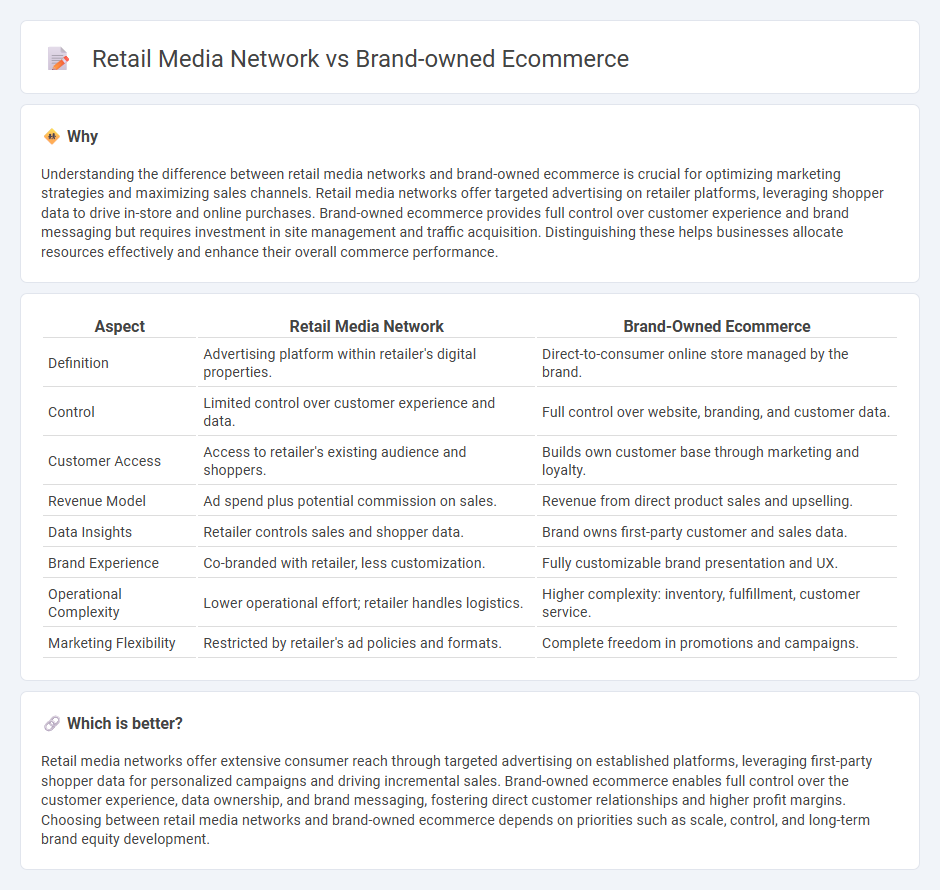
Retail media networks leverage retailer data and platforms to target shoppers directly, enhancing ad relevance and driving sales through personalized promotions. Brand-owned ecommerce focuses on building a direct relationship with customers by controlling the shopping experience and gathering first-party data for tailored marketing strategies. Explore the differences in strategy and impact to optimize your commerce approach.
Why it is important
Understanding the difference between retail media networks and brand-owned ecommerce is crucial for optimizing marketing strategies and maximizing sales channels. Retail media networks offer targeted advertising on retailer platforms, leveraging shopper data to drive in-store and online purchases. Brand-owned ecommerce provides full control over customer experience and brand messaging but requires investment in site management and traffic acquisition. Distinguishing these helps businesses allocate resources effectively and enhance their overall commerce performance.
Comparison Table
| Aspect | Retail Media Network | Brand-Owned Ecommerce |
|---|---|---|
| Definition | Advertising platform within retailer's digital properties. | Direct-to-consumer online store managed by the brand. |
| Control | Limited control over customer experience and data. | Full control over website, branding, and customer data. |
| Customer Access | Access to retailer's existing audience and shoppers. | Builds own customer base through marketing and loyalty. |
| Revenue Model | Ad spend plus potential commission on sales. | Revenue from direct product sales and upselling. |
| Data Insights | Retailer controls sales and shopper data. | Brand owns first-party customer and sales data. |
| Brand Experience | Co-branded with retailer, less customization. | Fully customizable brand presentation and UX. |
| Operational Complexity | Lower operational effort; retailer handles logistics. | Higher complexity: inventory, fulfillment, customer service. |
| Marketing Flexibility | Restricted by retailer's ad policies and formats. | Complete freedom in promotions and campaigns. |
Which is better?
Retail media networks offer extensive consumer reach through targeted advertising on established platforms, leveraging first-party shopper data for personalized campaigns and driving incremental sales. Brand-owned ecommerce enables full control over the customer experience, data ownership, and brand messaging, fostering direct customer relationships and higher profit margins. Choosing between retail media networks and brand-owned ecommerce depends on priorities such as scale, control, and long-term brand equity development.
Connection
Retail media networks leverage brand-owned ecommerce platforms to target consumers with personalized advertising, enhancing customer engagement and driving sales. These networks collect first-party data from ecommerce interactions, enabling brands to optimize marketing strategies and improve return on ad spend. Integrating retail media with brand-owned ecommerce creates a seamless shopping experience that increases conversion rates and fosters brand loyalty.
Key Terms
Direct-to-Consumer (DTC)
Brand-owned ecommerce platforms empower Direct-to-Consumer (DTC) strategies by allowing brands full control over customer experience, data collection, and personalized marketing efforts. Retail media networks leverage retailers' extensive shopper data and online traffic, enabling brands to target promotions more precisely within retail ecosystems. Explore how integrating brand-owned ecommerce with retail media networks can amplify DTC success.
Third-Party Marketplace
Brand-owned ecommerce platforms provide complete control over customer experience, data collection, and profit margins, enabling brands to build direct relationships with consumers. Retail media networks leverage third-party marketplaces by offering advertising opportunities within existing online ecosystems, enhancing visibility while benefiting from the platform's extensive customer base. Explore the strategic advantages of integrating retail media networks into your third-party marketplace approach to maximize brand reach and sales impact.
Retailer Monetization
Brand-owned ecommerce platforms provide full control over customer data and sales strategies, enabling brands to optimize marketing efforts and enhance customer experiences. Retail Media Networks (RMNs) monetize retailer-captured shopper data through advertising placements, allowing retailers to generate incremental revenue by targeting promotions to specific audiences. Explore how leveraging retail media networks can maximize retailer monetization and drive more efficient advertising spend.
Source and External Links
How to Build an Unforgettable Ecommerce Brand - This article explains key steps for building a strong brand in ecommerce, emphasizing differentiation through target markets, consistent quality, and distinctive product features to create brand loyalty.
14 Innovative Ecommerce Brands To Watch (2024) - It highlights the importance of ecommerce branding beyond logos, including defining brand story, voice, design elements, and centering the customer experience to build engagement and repeat business.
Ecommerce Brands: Best Examples + Keys to Success - Defines ecommerce brands as online retailers that create consistent style and voice across channels to foster customer loyalty, noting ecommerce's growing share in retail sales and importance for modern businesses.
 dowidth.com
dowidth.com